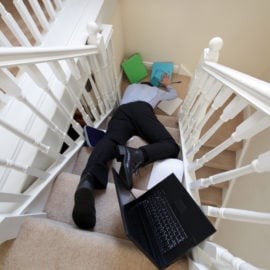
Workers’ compensation insurance pays benefits to Ohio workers who are injured while on the job. But what about when the job is being performed at home? Many people have been working remotely from home at the direction of their employers during the COVID-19 pandemic. We’ve received numerous questions about whether an injured employee is eligible for workers’ compensation benefits if injured while working from home.
You are eligible for workers’ compensation benefits if you are a covered employee who has been injured while engaged in activities within the scope of your assigned job duties. This has long been understood to include injuries suffered in accidents while traveling for work and while visiting clients’ places of business, such as a slip and fall accident.
During the COVID-19 pandemic, injuries suffered while working from home may also be covered by workers’ compensation insurance. If you are among the 42 percent of the U.S. labor force now working from home full-time and you sustain an injury while on the job, you should not hesitate to seek workers’ compensation benefits.
If your employer or the workers’ compensation insurance administrator disputes your right to benefits, you should have a knowledgeable workers’ compensation lawyer review the facts of how the injury occurred and explain your legal options. In northeastern Ohio, the workers’ comp attorneys at Heller, Maas, Moro & Magill, Co., LPA, help injured home-based employees appeal denied workers’ compensation claims and seek the full benefits available by law.
Don’t go without workers’ comp benefits just because the work injury occurred at home. Call us at 330-974-1231 or contact us online for assistance that starts with a free review of your case.
How Can I Receive Workers’ Compensation If I Work From Home in Ohio?
You are covered by workers’ compensation insurance based on your employment status – not based on the location where you perform your job.
In Ohio, all employers of one or more workers must maintain active workers’ compensation insurance coverage to protect workers injured on the job. Further, workers’ compensation is no-fault insurance. An injured worker is eligible for benefits if injured while working, regardless of how he or she was injured (with exceptions for intoxication or horseplay).
But you must be someone’s full-time or part-time employee to be covered by workers’ compensation. An independent contractor is not an employee and is not typically entitled to workers’ compensation benefits. Sole proprietors, partnerships, limited liability companies (LLCs), family farmers and religious officials (e.g., ministers) may buy workers’ compensation coverage, but it is not required.
If your employer directs you to or agrees that you will work from home (“telecommute”, “remote work”), then your home is your workplace. In Griffin v. Hydra–Matic Div., Gen. Motors Corp., 39 Ohio St.3d 79 (1988), the Court disagreed with the contention based on previous cases that there had to be “a special hazard” created by the work environment for an injury to warrant workers’ compensation benefits. Therefore, your home is no different from any other place of work in a workers’ comp claim.
Even the fact that you live other facets of your life concurrently with working from home does not affect a workers’ compensation claim. In Bremner v. Industrial Commission, 11th Dist. Geauga, 63 Ohio App. 387, 388 LEXIS No. 317 (1938), a workers’ compensation claim was granted for a switchboard operator who, while working from home, slipped on the front porch of her house while she was going to get milk for cereal she was going to eat while working.
The Court ruled that procuring food or other refreshments, although personal in character, is considered so incidental to an employee’s work that injuries suffered while doing so may be found to arise out of and in the course of the individual’s employment. This applies as long as the employee acts in a reasonable and prudent manner and the injuries occur while he or she is upon the employer’s premises or is– as a home-based employee is – subject to the employer’s control.

Further, courts have recognized that if all injury claims were denied simply because they occur at home, employers could completely escape their responsibility for providing workers’ compensation by requiring all employees to work from home.
Protect Your Work-at-Home Status for a Workers’ Comp Claim
An employer who might challenge a telecommuting worker’s workers’ compensation claim would be expected to charge that the employee was not working when injured.
Depending on your employer and job, you may be virtually connected to your company and/or colleagues while you work from home. If there is some automated system that shows who is online, it may provide evidence that you were at work at the time of an injury. Similarly, if you open or download and upload work assignments within an automated system, this activity would indicate your work status.
If your home office setup does not include an automated system that counts you as present each day, you should make a habit of making contact with a supervisor and/or coworkers at the start of each workday.
If you are injured, since there are no co-workers around to have witnessed your accident, it is important to document what happened in great detail. Report the injury to your employer in writing right away and seek prompt medical treatment. Make sure you report your injury via a medium that lasts, not through a live video connection, for example.
Ask your employer to provide you a copy of the incident/accident report he or she files with the company.
If possible, take photographs of your injuries and the accident scene to show where and how the accident happened.
When you visit the doctor, make sure he or she understands that you were working from home, and your injury is an occupational injury. Workers’ compensation benefits start if you miss more than seven days of work. If you are hospitalized or told not to return to work, tell the doctor who treats you that you expect to file a workers’ compensation claim. Your doctor can file a First Report of Injury (FROI), which is the first step toward filing a claim, with the Ohio Bureau of Workers’ Compensation (BWC).
In addition to documenting every aspect of your injury and the medical care you receive, make sure you obey all doctor’s orders, including making appointments. Any indication that you are not significantly hurt, such as blowing off medical care, can be used as evidence that you should return to work and do not need workers’ compensation benefits.
Contact an Experienced Ohio Workers’ Compensation Lawyer
At Heller, Maas, Moro & Magill, Co., LPA, our workers’ compensation attorneys see it as our mission to help Ohio workers who are injured while on the job obtain all of the workers’ compensation benefits that the law says they are entitled to receive. This includes workers who are injured while doing their jobs while working remotely at home. The law is on your side, and we will fight for you.
Don’t go it alone. Contact us for a free consultation about your workers’ compensation claim.
